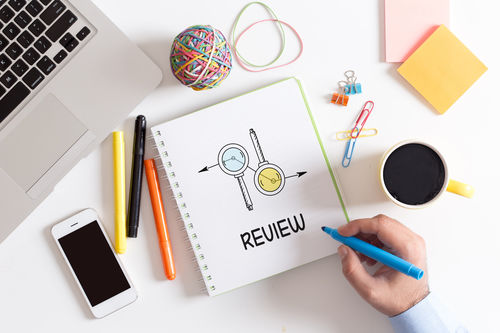Career
How I Worked Out a Formula for a Happy Me
Taking the self-review out of the office and into my mind's innerworkings.
Posted January 12, 2018

A week ago, I sat in front of my computer screen for hours and hours scrutinizing the latest draft of my 2017 performance review self-evaluation. I rubbed my blurry eyes, having scoured the digital document over and over correcting all my typos and clarifying all my points as best I could. I finally printed out what I thought to be the final version. On the paper copy, to my editorial dismay, I spotted yet another mistake almost immediately. Even though I’d proofread meticulously, I’d skipped over my title in the heading section at the top of every page, inverting two of the words. Instead of self-evaluation, I’d written evaluation-self. I corrected it, read the whole thing through, printed it again and submitted my report, just like the millions of other employees who engage in this common professional prerequisite describing how well our jobs were performed over the past year.
As I stapled, clipped and made sure all my charts and page numbers were in order, I mulled over my silly typo. Performance review evaluation-self. Long after the report had left my office, I continued to mull over this careless error and the compound word it formed: evaluation-self. My musings turned existential. What would it mean to review the evaluative nature of myself?
I’m not talking about a performance review of my entire self. No thanks. Personal goals met, tasks performed, etc. I do that all too often, but what if I looked at the past year specifically reviewing my process for making choices, and how those choices influenced my overall growth and wellbeing? In a year when my family and friends have remarked about how much happier I’ve become (and, truth be told, they’re totally right), it seems like a good time to figure out if my evaluation-self is partly to thank for it.
So how does one measure the evaluative self? Do I measure how quickly I assess the needs of a situation, whether or not I can tell if someone is telling a white lie, or my level of decisiveness with a restaurant menu? Would I count if I have fewer regrets than the last year, or how many moments I’ve felt vindicated or validated when everything came out exactly as I’d planned? This list of questions became so long it could have easily filled triple the amount of questions on a typical performance review form for work. It would also make for a pretty dull blog, so I changed course. Instead, I distilled my ever-expanding list down to a simple challenge intended to reveal how and why I make decisions. I asked myself if I could articulate an evaluation-self philosophy succinctly and accurately, and establish if using the philosophy made a positive impact this year.
To begin working through this, my thoughts turned to some of the big personal decisions I made this year. I moved in with my boyfriend, a major milestone considering the inevitable fear I have, as a divorcee, of fully integrating my life with someone else again. I applied to graduate school, a step I was never confident enough to take seriously in the past. I started writing to a pen pal I barely know in a state I’ve never visited. I started writing a book, a feat almost doomed to fail from a statistical point of view. I committed to doing 50 pushups in two minutes and six chin-ups—because that’s what Army Rangers must do to become Army Rangers (among many other daunting physical feats I will not be attempting). How are these drastically different choices related? I wanted to do them. I didn’t need to, but I really wanted to. Will I regret these decisions if what I hoped for them doesn’t come to pass? The answer is a resounding no. Where once I used to be exclusively a results-driven decision maker, I seem to have turned into what I’ll call an intention-based decision maker.
At a different point in my life, I wouldn’t rate these choices until I knew their ultimate end, their desired results: I marry my boyfriend, I get accepted to grad school and I have a book on Amazon to blog about next year. At the moment, the success of these ventures is far from my reach… especially those chin-ups. I’m genuinely happy with my progress, though, albeit slow and uncertain.
I have to admit that this is quite the opposite way I evaluate things in my professional life even now and in many day-to-day practical life choices too. I make tons of work decisions based entirely on what is asked of me or what choice will get a desired result. And if the result is different, I generally wish I did something differently too. Being a people pleaser, reading others and anticipating results are valuable skills, but that kind of ROI-driven reasoning rarely enlivens the spirit. How might you ask did I get so good at people pleasing? For me, it was a defense mechanism I devised to decrease the discomfort I felt with being imperfect. My default evaluation settings were always focused away from me. In the classroom and at home I was rewarded for doing precisely what I was told to do. At home, my diligence in school was rewarded by my parents, as most parents tend to do. Somewhere along the line this was imprinted in my psyche as an overarching rule. The happiness of others will bring you happiness. Thankfully, I’ve grown out of this compulsion and realized that simply wanting something for myself for whatever reason I have, or even no reason at all, is okay sometimes.
The best way I could express this in a succinct and accurate way was with the following equation:
Goal x (Desire + Action)/ (circumstances + realistic expectations) = Happy Me
It may not work for everyone, but this kind of math makes emotional sense in my life. Little by little, I’ve become wiser in knowing which situations require one set of evaluation skills and which require the exact opposite. I can sense in my body when it's time to want something and speak out and time to follow a rule as closely as possible. This past year, knowing the difference has made all the difference.


